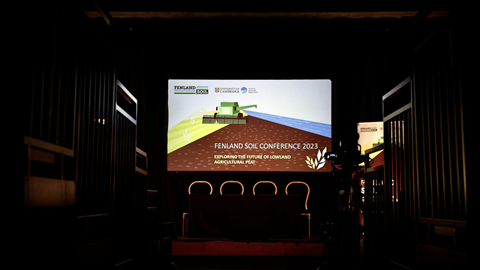New event offers knowledge exchange and networking around issue of lowland agricultural peat
The inaugural Fenland SOIL conference has been held at The Maltings in Ely, bringing together stakeholders to explore the future of lowland agricultural peat.
The conference was hosted in partnership with The University of Cambridge Centre for Landscape Regeneration and was attended by over 200 delegates including farmers from across the East Anglian Fens and lowland agricultural peat production areas across the UK.
The conference was well attended by university delegates from various institutions, as well as environmental groups, local government, national retailers, policy makers from Defra and a range of other stakeholders from across the Fens.
Delegates heard presentations from some of the UK’s leading academics on peat and sustainability from UKCEH, Cranfield University and The University of Cambridge, alongside talks from leading peatland academics from Canada, the Netherlands, Germany and Sweden.
The event was chaired by John Shropshire of G’s Fresh and chairman of Fenland SOIL, with sessions moderated by Dr Tina Barsby, recently retired CEO of NIAB, Fenland farmer Michael Sly and chair of the NFU Sugar Board and Prickwillow farmer Tom Clarke.
The evening reception was opened by the Mayor of Cambridgeshire and Peterborough Combined Authority Dr Nik Johnson, who introduced keynote speaker, BBC Countryfile and Sky TV journalist Tom Heap, who has recently published his book and Radio 4 podcast “39 Ways to Save the Planet”.
Peat use and net zero
Fenland SOIL was formed in 2021 in response to the Cambridgeshire and Peterborough Independent Commission on Climate, which published its landmark report in October 2021. This research identified that the region’s farming practice and agricultural peat use is a significant obstacle in the journey to net zero by 2050, with peatland emissions estimated to account for up to one third of the region’s carbon release.
As a farmer-led organisation, Fenland SOIL set out to recognise the importance of the Fens and ensuring that farmers respect and preserve the Fens for future generations as a key aspect of UK food security and thriving environment for wildlife and biodiversity.
Currently the Fens account for 33 per cent of England’s fresh vegetable production, employing over 80,000 people with a food supply chain value of £3.1bn, while being home to half a million residents and 13,000 different animal and plant species. Lowland peat areas across the UK are an integral constituent of UK agricultural production.
At the core of Fenland SOIL is an ambition to bring key stakeholders together with a united front and through showing proactivity, being able to positively influence and help shape policy so that it is fair and realistic for those that will be implementing it.
Commenting on the conference, Megan Hudson, general manager of Fenland SOIL, said: ”We were delighted to bring together some of the leading minds in lowland agricultural peat production. We have been able to start a dialogue between different stakeholders and share what we see as emerging best practice for lowland agricultural peat production.
”Linking farmers with some of the UK and Europe’s leading peatland academics and encouraging networking between the various stakeholder groups can only be a positive thing. The output of the conference and work of Fenland SOIL will help to shape policy thinking within government and best practice for farmers as we strive towards net zero by 2050.”




